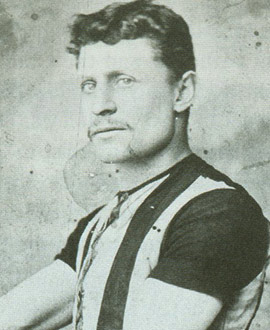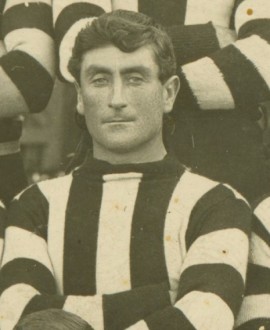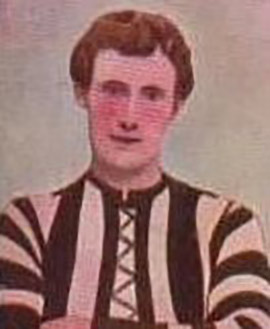As a child growing up in Fitzroy, Alf Dummett dreamed of playing just a single game with Collingwood. In the end, however, he achieved so much more than that, through a gloried playing and administrative career that eventually spanned more than 50 years.
Dummett was just 12 when the Collingwood Football Club played its first game – old enough to understand the significance of the moment. Even though his family lived at the Fitzroy end of Johnston Street, Dummett was one of those caught up in the excitement of the new club, which was the talk and the pride of the suburb of Collingwood. He was football-mad as a kid, and the buzz surrounding the new club was enough to make it more appealing than the more established Fitzroy.
By 19 he was playing with the Collingwood Juniors, a lower level club affiliated with the senior Magpies. In 1900 he did well enough to earn himself a spot in a Combined Juniors team that played Footscray prior to the 1901 season. The Pies had been keeping an eye on him over the past two years, and his performance for the Combined Juniors was enough to convince selectors to elevate him into senior ranks just a few weeks later for the opening round of 1901 against Essendon.
Initially overawed to be playing alongside his childhood heroes, Dummett quickly adapted and displayed the cool, assured defensive work which became the trademark of his career.
Universally known as 'Rosie', because of his ruddy pink cheeks, Dummett became a stalwart of the Magpie defence for the next decade, playing mostly in the back pocket or on the half-back flank. He was tall and wirily built, good in the air but still with enough pace to provide some run. In today's parlance, he was a good 'third tall' in defence. He was deceptively strong, a fine mark, a solid kick and possessed superb judgement.
The Herald once described him as "one of the soundest Magpie defenders of this period". Markwell, in the Australasian, wrote that: "Dummett was quick on the ground, clever in the air and resourceful under every emergency. He was clean in picking up the ball and very effective in dashing out from the back line."
This combination of pace and aerial skills made him a valuable team member. But even more important was his consistency. He rarely put in a bad game, and even more rarely missed one through injury. Collingwood learned early that it could always rely on 'Rosie' when the chips were down.
And the chips were certainly down in 1906, with the club racked by a hitherto unprecedented level of internal disharmony. Charlie Pannam had been captain in 1905, but was challenged for the top job in 1906 by Oscar Hyman. In the end the mantle passed to the ever-popular Dummett as a kind of compromise candidate.
But both sides seemed to feel aggrieved with the end result, and their unhappiness continued into the season. The coach, Dick Condon, also got involved and had to be stood down for a couple of weeks, as did vice-captain Jack Monohan. Dummett tried to bring everyone together, but struggled to battle both the power of the competing forces and also, for the first time, his own loss of form.
In the end, his own struggle for form proved too much and, after missing a couple of games mid-season, he reluctantly handed over the captaincy to Arthur Leach.
Rosie must have been glad when 1906 ended, but 1907 proved to be even worse – he damaged his knee so badly in the first practice match that he missed all but one game of the home-and-away season. Many felt his career was over, but he returned to some of his best form in 1908, playing all 19 games and once more winning the plaudits of the critics. Sport newspaper said he "appeared to be in better fettle than ever", while the Football Follower said he "was in the right place every time, made no mistakes and gallantly saved the citadel many a time and oft."
Still, Dummett's career wound down in the next two years, and he hung up the boots after just a single game (to qualify for 10 years service) in 1910. The very next year he was elected to the Collingwood Committee, became a selector and also became central to the development of the club's social activities, organising events for players, families and supporters.
He was founding secretary of the Collingwood Footballers' Cricket Club when it formed in 1912, became a vice-president at Collingwood in 1922 and then took on the role as the club's VFL delegate. Such was the regard for his football knowledge, and eye for talent, that he became a Victorian selector in 1925, and later held the post of chairman of selectors for 16 years.
His whole family became even more embedded in Collingwood, too. A brother, Charles, played a few games towards the end of Rosie's career. The family also started Dummett's boot factory, which supplied boots to Collingwood players for more than 30 years. Rosie himself could often be found repairing or studding the boots of Magpie players.
He was a much loved figure wherever he went. Bill Twomey Jnr once described him as being "the most gentlemanly person in Australia". And Harry Collier, who got to know Dummett in the 1920s, later said: "You just wouldn't get a better person. Rosie was what this club is all about – just a real good Collingwood bloke."
For somebody who devoted as much of his life to Collingwood as Rosie Dummett did, that is surely the perfect epitaph.
- Michael Roberts





